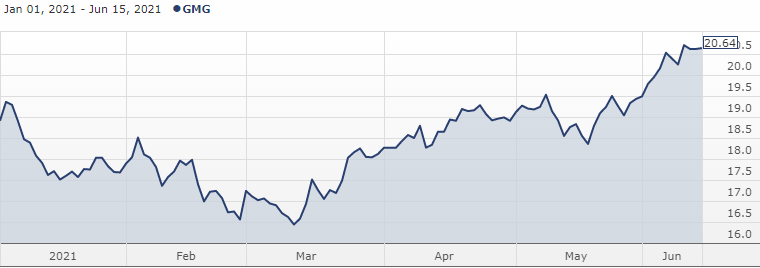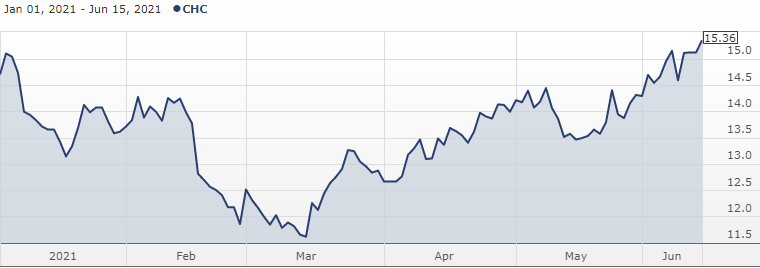If you are a share market investor who still reads newspapers in print, you may casually glance over the property section on your way to, say, the share price pages, sport updates or the weekly cultural agenda. If so, you may have missed one of the most profound changes taking place in the valuation of financial assets.
It is the reason why some of Australia's owners of bricks and mortar have been among the best performers on the ASX in recent weeks, including Centuria Industrial REIT (CIP), Goodman Group (GMG) and Charter Hall (CHC), with share prices up circa 27% in all three cases in less than three months.
As always, there are multiple drivers in place, but investors should not simply assume that a generally more relaxed attitude towards inflation, as also expressed through much less volatile bond markets, is the sole responsible factor for this remarkable bounce in share prices.
Quality industrial is the new black
An important clue of what is driving share prices of the property owners and developers mentioned can be found in the recent market update lodged by Centuria Industrial REIT to the ASX on 1 June 2021.
In it, Australia's largest listed pure play owner of industrial assets revealed a general re-assessment of the asset portfolio had led to an 11% increase in like-for-like book values, in large part the result of the Weighted Average Capitalisation Rate falling by -42bp to 4.53%.
If this had been an announcement made by a producer of iron ore, gas, copper or even poultry or cattle, the news would have been splashed across the front pages of major newspapers, with highlights on the evening news bulletins.
But industrial property?
What we are experiencing is potentially a seismic shift in the valuation of highly sought-after bricks and mortar assets. It is driven by the fact that assets such as data centres and modern warehouses have a direct link to new megatrends such as e-commerce and the explosion in data usage. And more traditional property assets, including offices and shopping malls, now carry a lot of question marks about their value and use-by date.
Investors in the share market are still debating whether work-from-home is here to stay and in what capacity, or how much more value depreciation lays ahead for shopping malls in CBDs and quiet neighbourhoods. But it appears large investors in property markets have already made up their mind.
From the aforementioned Centuria statement:
"Australia's industrial real estate market remains a highly sought-after sector attracting investment demand from domestic and international capital. Within the past six months the market has seen elevated transaction volumes with major asset and portfolio sales setting new benchmarks, which has resulted in significant compression of capitalisation rates compared to previous reporting periods. A substantial weight of capital continues to create competition for quality assets."
Lower cap rate means higher values
For those who are less familiar with the specific lingo used, Weighted Average Capitalisation Rate or 'cap rate' is effectively the income from the property as a percentage of the total value ascribed.
If you pay $100 and the contractual income is $5 per annum, the cap rate is 5%.
But here's where strong demand and changing risk perceptions are starting to change property market values and dynamics.
A cap rate of 5% seemed pretty final up until last year. In 2021, as also indicated by that ASX statement, the cap rate for a modern, quality industrial asset is trending towards 4.5%, and potentially closer to 4%.
What this means, in our example of an asset valued at $100, is that investors are now willing to purchase that same property for $110, bringing the cap rate down to 4.5%. Were that cap rate to drop to 4%, the same property would be worth $125.
It has taken a while but the share market is now genuinely paying attention. And so is the rest of the sector. No doubt, similar revaluation updates are being prepared at Goodman Group, Charter Hall and other listed owners of similar properties, including Charter Hall Long WALE REIT (CLW), Stockland (SGP), GPT Group (GPT) and Mirvac (MGR).
All have experienced firm share prices in recent months, though not necessarily in line with the three peers mentioned earlier. The real stand-out, however, is Mirvac whose share price has now rallied more than 30% since bottoming in February. Mirvac also brings along a firm leverage to domestic residential markets, as well as offices and commercial retail.
In similar vein to, for example, Charter Hall, Mirvac's portfolio also includes assets that might have to be devalued (office and retail), but investors are taking the view the positives from the industrial assets portfolio outweigh any negatives.
Goodman Group and the 'value' debate
The above would in particular apply to Goodman Group and Charter Hall whose creating-value-for-shareholders strategies are closely intertwined with asset management and new project development.
Within this context, it is telling that sector analysts at JP Morgan recently discussed whether Goodman Group should now be treated as a high-quality growth stock on the ASX.
JP Morgan suggests the answer is 'yes'. On its assessment, current projects under development virtually guarantee 10-15% per annum in sustainable growth in Assets under Management (AUM) and management fees. The broker also believes that were margins and developments to come under pressure, the company's balance sheet can be used to support growth in earnings.
JP Morgan believes Goodman Group's strong growth profile will last for the next 3-4 years, with a projected 14% CAGR in earnings per share over the next three years. Ultimately, the broker acknowledges, annual growth in EPS will revert back to the old and familiar 6-8%, but few investors would be concerned about such slowing in today's context.
Years ago, Goodman Group used to be a staple for retirees seeking steady income from the share market. The re-rating of the stock that has occurred since has triggered many calls of over-valuation. It is fair to conclude those calls were looking in the rear view mirror and wrong, as the share price has continued to set new all-time record highs.
Chart 1: Goodman Group (A$)

Source: Morningstar.com.au
Goodman Group shares have now doubled in value since mid-2018. Clearly, sector analysts at JP Morgan don't think the share price has travelled far enough north just yet, as also indicated by the fact all seven stock brokers in the FNArena universe who cover the stock still hold a positive view.
The upcoming asset revaluation update is simply another positive in support of a share price that is now trading on a forward multiple of 28x on FY22 consensus forecasts for an implied dividend yield of 1.5%.
Mind the differences
For Charter Hall, which is a lot smaller than Top 20 member Goodman Group, the numbers look slightly different with FY22 forecasts implying today's PE multiple is only 21.5x for a yield of 2.7%.
Investors should not assume the exact same dynamics apply equally to all companies in the sector. Charter Hall combines two of Goodman Group's prime features - asset management and industrial project development - with offices, commercial retail and social infrastructure. Its EPS growth profile, judging from the years past, is also less steady and predictable.
Chart 2: Charter Hall Group (A$)

Source: Morningstar.com.au
Centuria Industrial REIT is yet again another few steps down from Charter Hall in terms of market capitalisation. Given its much less diversified scope, it is valued in more traditional REITs style, being dividend yield relative to bond yields. The share price is probably due a pause, but nevertheless supported by strong industry dynamics.
A potential turning point for property valuations
The conclusion from all of the above is that we might be witnessing a major schism inside property market valuations driven by COVID-19 and identifiable megatrends that will remain with us for many more years to come.
Assessing the exact impact and consequences won't be easy for investors, as no two assets are identical, while most REITs and asset owners have different portfolios, profit drivers and strategies.
But times they are a-changing and for the likes of Goodman Group, Charter Hall and Centuria Industrial REIT it is more than plausible this year's new dynamic will cement their profile as the better growth alternative among peers.
Rudi Filapek-Vandyck is Editor at the FNArena newsletter, see www.fnarena.com. This article has been prepared for educational purposes and is not meant to be a substitute for tailored financial advice.